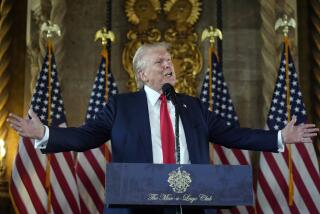Forgery Is Alleged in Killer’s Clemency Bid
- Share via
Sworn statements of five of six jurors urging clemency for death row inmate Michael Morales -- a convicted murderer they recommended be executed -- were forged documents, the San Joaquin County district attorney’s office said Friday.
Prosecutors and legal scholars predicted that the development would cast a pall over Morales’ efforts to persuade Gov. Arnold Schwarzenegger to stop his Feb. 21 execution and commute his sentence to life in prison without parole.
“Let’s put it this way: It can’t help him,” San Joaquin County Deputy Dist. Atty. Charles Schultz said. “The affidavits were forged, complete works of fiction. Whoever wrote them broke the law.
“It’s amazing. If you wrote this up for a movie script, it’d be rejected because it’s too far out.”
Late Friday, however, one of Morales’ attorneys defended the documents. “We stand by the validity of our investigation and the information we provided the governor,” David Senior said in a statement.
Loyola University law professor Laurie Levenson, a former federal prosecutor, said Morales now faces a difficult task in trying to salvage his clemency petition.
“It’s unbelievable. This just dooms the man’s fate,” she said. “Now, he’s not just a killer, he’s a liar and a cheat too. I think the governor will be outraged that someone was playing him for a fool.
“But it’s also a fraud on the legal system. Perhaps Morales and his defense lawyers can try to distance themselves. But they have a lot of explaining to do.”
The affidavits were submitted Tuesday -- under seal -- to Schwarzenegger on Morales’ behalf by his high-profile defense team: Senior and former Whitewater independent counsel Kenneth Starr.
Starr was unavailable for comment Friday. In a brief interview, Senior said, “I’ve heard that story from them before,” referring to prosecutors’ questions about the validity of the documents. “If they want a hearing, we can sort the whole thing out.”
But later, in a statement, Senior chastised prosecutors for failing to “contact either Mr. Starr or me regarding these provocative allegations.”
“It goes without saying we have seen nothing to back up their charges,” he said, “which appear timed to grab headlines rather than elicit a considered response from Mr. Morales’ lawyers.”
In legal arguments submitted to Schwarzenegger on Friday, prosecutors named Kathleen Culhane as the Morales investigator who “supposedly interviewed five of the six jurors” who allegedly had a change of heart.
Culhane, they added, also said she had interviewed a key witness in the case, Patricia Felix.
They said that in her own sworn declarations, Culhane said she had met with Felix several times in January at Felix’s home in Stockton, Calif. Felix has not lived at the address Culhane cited since July 2005, prosecutors said.
Similarly, the five jurors in question told prosecutors under oath this week that “they have never been contacted by anyone from the Morales team, that they have no idea who Kathleen Culhane is, that they did not sign declarations the Morales team attributed to them, and most importantly, they do not support clemency,” prosecutors said in arguments presented to Schwarzenegger.
One juror’s name was misspelled on one of the documents described as fabricated.
“I never would have signed a declaration under penalty of perjury that included a misspelling of my name without at least correcting the misspelling,” said the juror, whose name was redacted from the new declaration.
A sixth juror also submitted a sworn declaration, but it was not forged. In it, the juror left the decision on Morales’ fate up to the governor.
A spokeswoman for Schwarzenegger said he would review all clemency-related information submitted to him by attorneys on both sides of the case.
In the meantime, on a separate legal front in the Morales case, a federal judge in San Jose is expected to rule by Tuesday on whether to block the execution long enough to determine whether lethal injection is unconstitutionally cruel and unusual punishment.
Morales’ team argues that a paralyzing agent in the lethal injection procedure masks whether the inmate is in extreme pain before death.
U.S. District Judge Jeremy Fogel’s ruling has the potential to block all executions in California until the matter is resolved.
More to Read
Sign up for Essential California
The most important California stories and recommendations in your inbox every morning.
You may occasionally receive promotional content from the Los Angeles Times.











